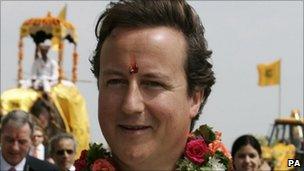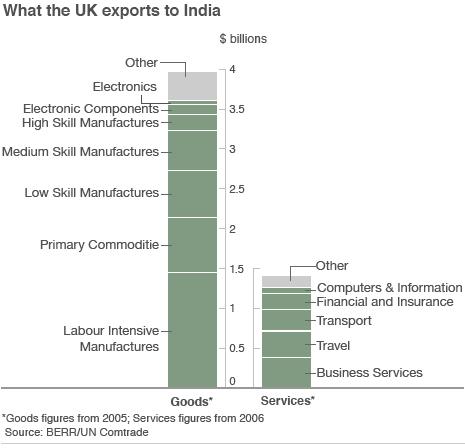David Cameron launches Indian trade drive
- Published
The prime minister is leading what Downing Street describes as the largest UK trade delegation in living memory
David Cameron has begun a two-day visit to India with the aim of strengthening relations and creating jobs in the UK.
The prime minister is leading what Downing Street describes as the largest UK trade delegation in living memory.
Beginning his tour in Bangalore, Mr Cameron will say he wants to make the UK the "partner of choice" for India.
Business Secretary Vince Cable has announced the government will allow the export of British civil nuclear technology to India for the first time.
'Business potential'
The Foreign Office and Ministry of Defence have previously been against such a move because India is not part of the Nuclear Non-Proliferation Treaty.
However, Mr Cable believes British businesses "potentially could do a large amount of business in India" as a result of the move, which will also allow British expertise to be shared.
The business secretary, speaking in Bangalore, said: "There are obvious security sensitivities. We are conscious of those, as are the Indians.
"But within those constraints we really want to push ahead with civil nuclear co-operation."

The two government also announced a deal between BAE Systems, Rolls-Royce and India's leading aerospace company Hindustan Aeronautics Limited to supply 57 Hawk trainer aircraft to India. It follows a previous agreement to supply 66 Hawk aircraft to India.
The deal is worth about £700m, of which more than £500m is for BAE Systems and up to £200m for Rolls-Royce, the UK government said, adding that the deal will support 200 UK jobs.
Mr Cameron said the deal was "evidence of our new, commercial foreign policy in action".
He has also used the visit to speak about the relationship between India and Pakistan.
He said it was "unacceptable" for Pakistan to support any organisation involved in terrorism.
Speaking at a question and answer session with journalists, he said: "It's well documented that that has been the case in the past and it's an issue that we have to make sure that the Pakistan authorities are not looking two ways, they must only look one way."
Mr Cameron is being accompanied on his visit by other senior cabinet colleagues and dozens of business executives.
The British government regards India as a vital regional and economic partner in the drive to boost exports and investment.
In an article for The Hindu newspaper, external, Mr Cameron wrote: "I have come to your country in a spirit of humility.
'Jobs mission'
"I know that Britain cannot rely on sentiment and shared history for a place in India's future.
"Your country has the whole world beating a path to its door. But I believe Britain should be India's partner of choice in the years ahead. Starting this week, that is what we are determined to deliver."
In a speech at the IT firm Infosys in Bangalore, Mr Cameron said he was on a mission to create jobs in the UK but also stressed that there was much for India in a "new relationship" with the UK.
"I want to take the relationship between India and Britain to the next level. I want to make it stronger, wider and deeper."
The prime minister said that 90,000 people were employed in the UK by Indian firms, and many more because of the activities of British firms in India.
"Now I want to see thousands more jobs created in Britain, and of course thousands more in India through trade in the months and years ahead. This is the core purpose of my visit," he said.
"This trip is a trade mission, yes, but I prefer to see it as a jobs mission."
British High Commissioner to India Sir Richard Stagg said Mr Cameron hoped to forge a new special relationship after a period in which ties had stagnated, adding that the visit was "unique in scale and ambition".
Among those who have travelled to India with Mr Cameron are Chancellor George Osborne and Foreign Secretary William Hague.
The sizeable business delegation includes the bosses of Barclays, Vodafone, SAB Miller and the English Premier League, while leading academics and sporting figures - including 2012 Olympics chairman Lord Coe - have also made the trip.
'Easier access'
Pointing to Indian involvement in UK car manufacturing and steel production, Mr Cameron is expected to call on India to reduce trade barriers in banking, insurance, defence manufacturing and legal services.
The BBC's Laura Kuenssberg, who is travelling with the PM, said he would argue for easier access for British business to set up and trade in India, and promise to make the British economy as open as possible to India.
But she said Indian ministers had already voiced concerns about the coalition's moves to introduce an annual cap on migrants from outside the EU entering the UK.

Mr Cameron last visited India in 2006
Mr Cable attracted attention after telling the Indian media that he wanted the UK to have "as liberal an immigration policy as it is possible to have".
He told the BBC the "key point" was that the policy had to be "flexible".
"Companies expect to be able to move their staff around simply to do their job and it's my job as business secretary to make that case," he said.
Our correspondent said she expected Mr Cameron to be pressed on the potential contradiction between arguing for the UK to attract more talented Indian professionals but restricting immigration at the same time.
On Tuesday, a Downing Street spokeswoman said the Home Office had made it "very clear" it wanted to see net annual migration fall from hundreds of thousands in recent years to tens of thousands.
Since taking office, the coalition has stressed the need to place economic co-operation and trade development at the heart of its foreign policy, with increased focus on fast-growing economies in Asia and Latin America.
The BBC's economics editor Stephanie Flanders said Britain now exported more to the Irish Republic than it did to Brazil, India, Russia and China combined.
As well as making the case for increased two-way investment, Mr Cameron is expected to discuss foreign policy and security goals with Indian leaders, focusing on joint counter-terrorism initiatives and support for Afghanistan and Pakistan.
Mr Cameron travelled to India from Turkey where he pledged to help the country's EU entry bid.
He last visited India in 2006, in his first year as opposition leader.

- Published28 July 2010
- Published27 July 2010
- Published27 July 2010